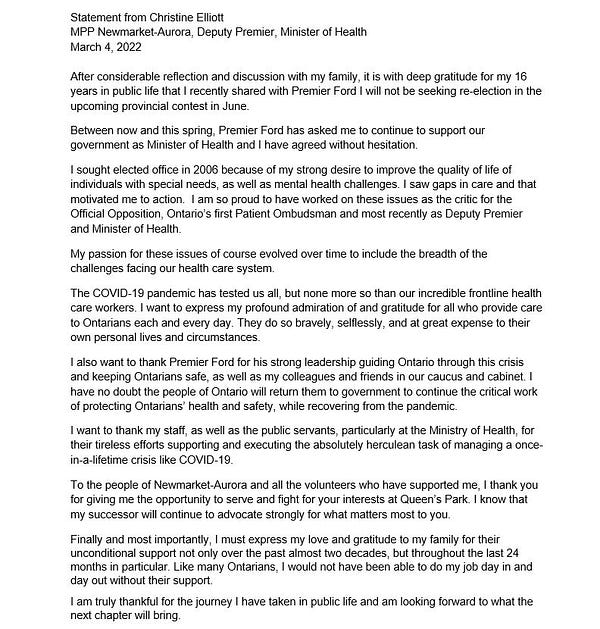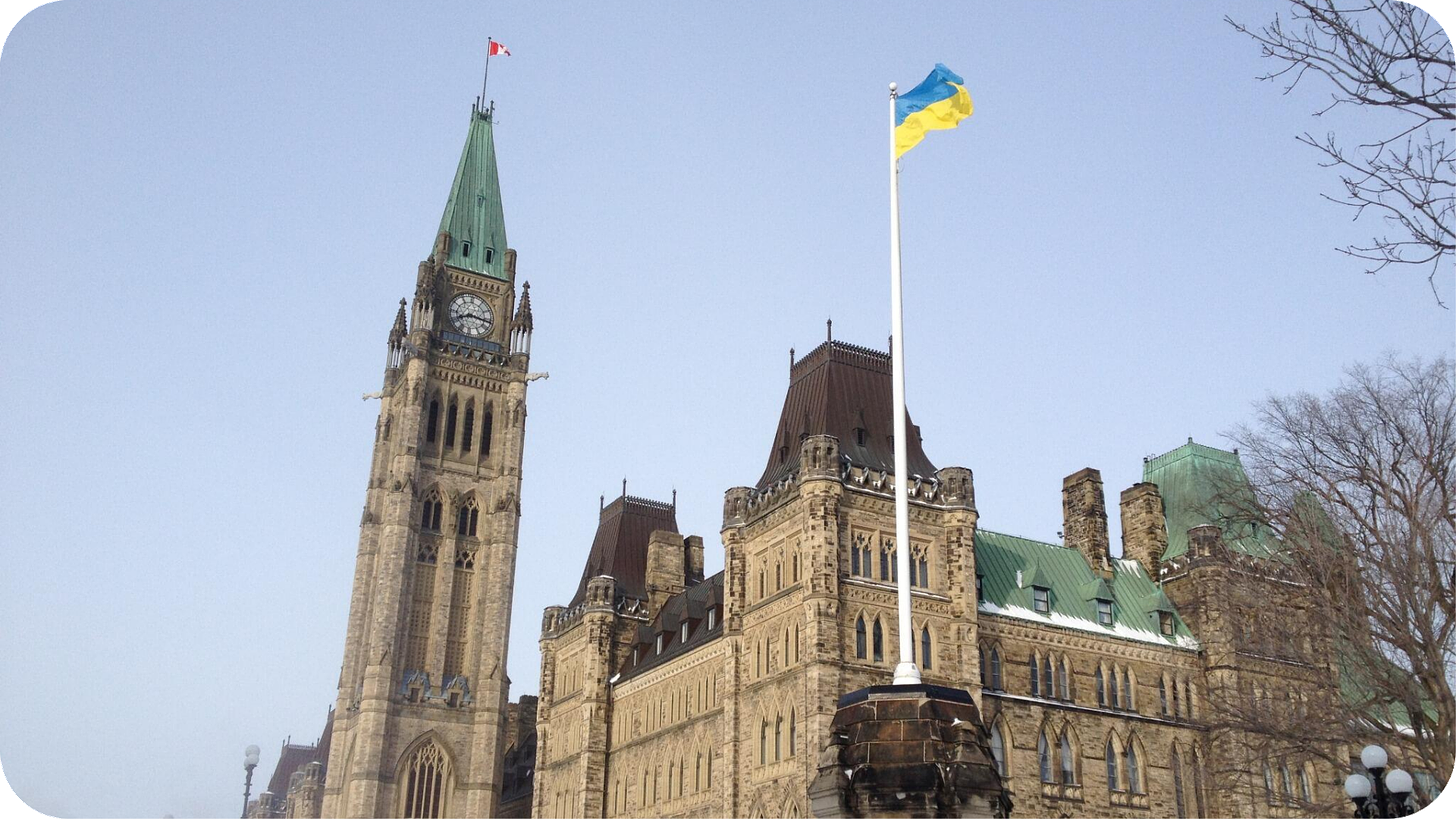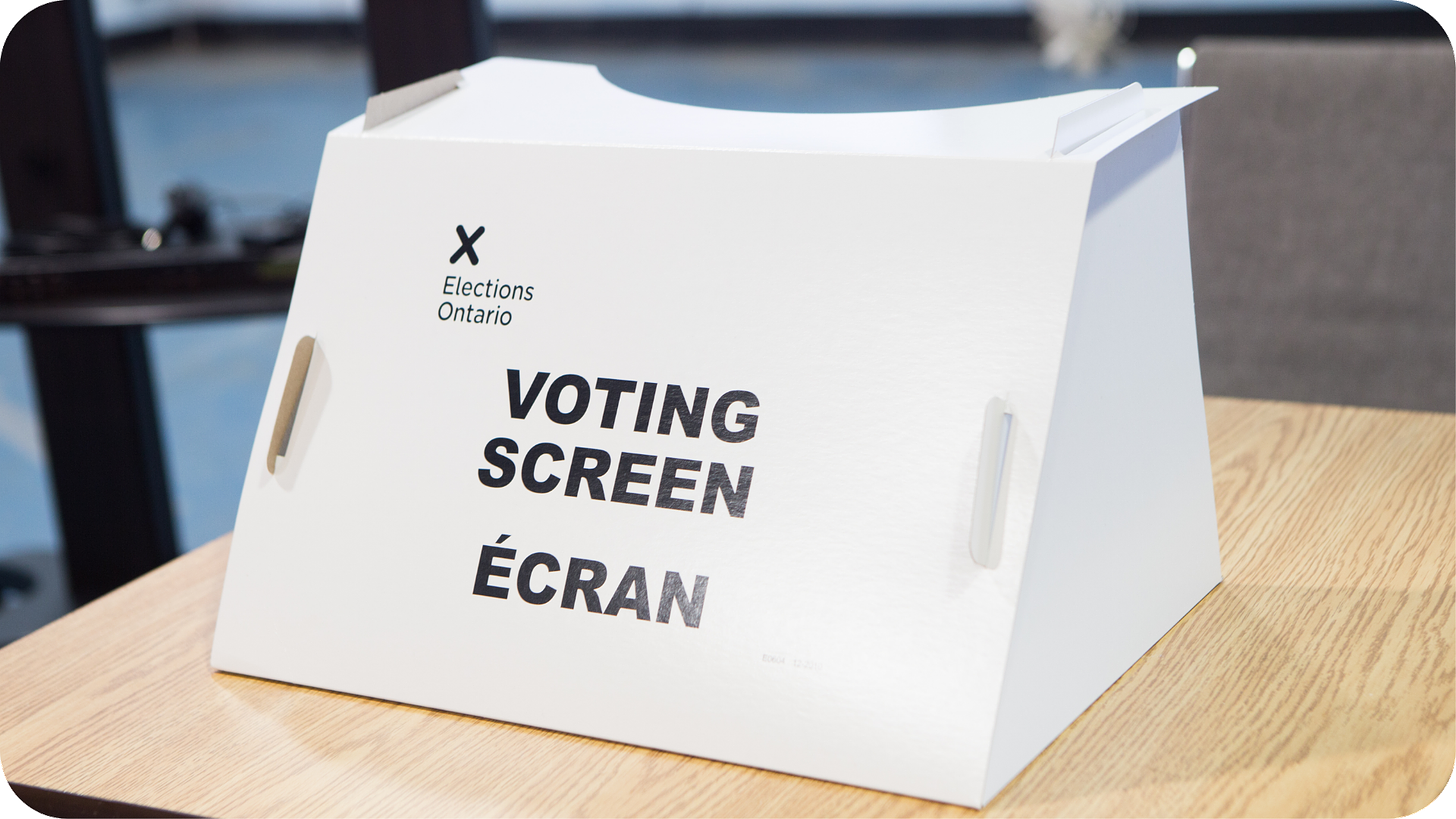Russia invades Ukraine — and Canada's response
In this edition: the latest on Ukraine, McPherson on Ottawa's response, Moore OKs voting in schools, in-person biz resumes at Queen's Park, mulling a leadership run
Happy Monday. Welcome to POLICORNER — your insider’s guide to Canadian politics, policy and power. The House of Commons is out for the week. MPPs will be at Queen's Park until Thursday. What will you be watching? Drop us a line.
In this 10 minute read, the latest on the Russian invasion of Ukraine. NDP MP Heather McPherson speaks on Ottawa’s response and welcoming Ukrainian refugees. Brown mulling a Conservative leadership run. Plus, Moore OKs voting in schools and COVID-19 measures nixed at Queen’s Park.
THE LEDE
We are now in the second week of the Russian invasion of Ukraine — Prime Minister Justin Trudeau is in Europe to discuss the response to the situation and slap new sanctions on Putin-allies, while new United Kingdom intelligence shows Russian forces made “minimal ground advances” over the weekend.
Here’s the latest on the situation in Europe — and Canada’s response to it:
The Ukrainian and Russian sides met in Belarus for a third round of cease-fire talks that began a week ago. Ahead of the talks, the Kremlin outlined conditions that must be met for Russia to cease the attacks — constitutional changes must be made to guarantee Ukraine’s neutrality and the country must recognize Crimea as a part of Russia and the independence of the eastern separatist regions.
Sanctions are still coming. Trudeau — who is on a week-long trip to Europe — met with his British and Dutch counterparts in London to unveil new sanctions on ten Russian individuals who are “complicit in this unjustified invasion.”
Who’s on the list? The slate of embargoed Putin allies — compiled on the advice of jailed Putin critic Alexei Navalny — includes government officials Mikhail Murashko and Dmitry Patrushev, Kremlin press secretary Dmitry Pskov and the editor-in-chief of RT Margarita Simonyan. See the full list here.
Ottawa has harnessed other sanctions since the start of what Russian President Vladimir Putin called a “special military operation” in the neighboring country. Anti-tank weapons and ammunition were deployed to Ukraine and Ottawa has banned imports of Russian oil. Putin — alongside his top diplomat Sergei Lavrov and senior officials — were sanctioned or had their assets frozen. Russia’s central bank was also targeted in an effort to “suffocate the Russian regime.”
Next on Trudeau’s itinerary are visits to other EU nations.
His cabmins are also dispersed across Europe: Foreign Affairs Minister Mélanie Joly is in Romania and Defence Minister Anita Anand is in Latvia. Economic Development Minister Harjit Sajjan is in Geneva meeting with UN and NGO partners before travelling to undisclosed locations in Eastern Europe.
Bipartisan support in Ottawa — but calls for more action
The already-implemented sanctions targeting Russia have received bipartisan support — though Opposition parties say Ottawa can do more.
Hot off the press: In a statement released earlier today, Conservative MPs Michael Chong, Kerry-Lynne Findlay and James Bezan say they “continue to support the actions taken to date,” but believe more can be done. The party is calling on Ottawa to resume CF-18 policing operations in Ukraine and send field hospitals and surplus army vehicles in support.
At the Standing Committee on Foreign Affairs and International Development, Conservative foreign affairs critic Michael Chong introduced a motion to “condemn President Putin and the Russian Federation for their unprovoked attack and invasion of Ukraine” that was unanimously passed.
‘A conflict unlike others we’ve seen in the past’ — McPherson on Canada’s response to the crisis
Days following the start of the Russian invasion, we spoke virtually with NDP MP Heather McPherson — the party’s foreign affairs critic — to discuss the conflict in Europe and Canada’s response to the situation. Here are the highlights:
On the speed of our response: “For the longest time, the NDP has been calling for de-escalation and diplomacy. In this particular conflict, we do have the most Ukrainian diaspora outside of Russia and Ukraine. We have a large role to play. At the beginning, it felt like we were implementing a little bit of measures here and there. What we’ve heard from the Russian ambassador is that sanctions don’t work. I think when they are applied in a slow way, they don’t work.”
On additional measures that can be taken: “Investing in humanitarian supports is where Canada shines. We know this is a crisis unfolding and that it is going to be a long-term crisis. Let’s invest in and put a plan in place for supports.”

On immigration and travel: “I'm seeing Minister Fraser say we ‘have a new phone line, we're gonna prioritize it.’ You can’t prioritize if there isn't the capacity. We already dropped the ball on Afghanistan. They can promise anything they want but we don't have the ability to do that. The only way we could with IRCC limitations is visa-free travel for Ukrainian citizens. There are also little things that are happening. Right now, you still have to get a COVID-19 test to get out. You can’t get a test in a war zone. That’s not how war zones work.”
On expelling the Russian ambassador: “It's always a toss-up. On one hand, how do you say that you want to come up with a diplomatic solution when you have kicked the ambassador out? With that said, the more I thought over the last few days, I think that it is something that needs to be done. We still do have the embassy staff. If this is only a symbolic gesture, it is an important gesture.”
Grading the response: “I want to be fair to the government. We don't have certain capacities that other countries may have. There can be a real argument on why that is the case. But when considering our response, I've been disappointed in the timing and speed. If I had to give a grade, I would probably give a C.”
SCOOP: Moore OKs voting in schools
Schools have been given the green-light for use in the upcoming June election. A memo from Ontario’s top doctor Kieran Moore — obtained by newsBeyond — confirmed that schools can be used as polling stations in June.
Details of the public health recommendations are consistent with that of the federal election. Moore told chief electoral officer Greg Essensa it is “challenging to be specific” as the election is still months away and the advice is “subject to change as we continue to monitor pandemic trends.”
The advice: Moore’s recommendations are three-parted and should be considered “particularly in elementary schools” — schools must have a direct path to the polling station and there must be a separate entrance and exit for voters. Students and staff must be kept away from the general public.
“Access to schools is a key component of running an election,” Elections Ontario said in a statement to newsBeyond — confirming that schools will be used as polling stations in the upcoming vote. “We have been working with the Office of Ontario’s Chief Medical Officer of Health and are following their recommendations to safely deliver in-person voting.”
“Access to schools is a key component of running an election. Schools meet accessibility requirements, are central to a neighbourhood, and are well known to the community, which is why Ontario’s Election Act and Education Act make schools available as voting locations.”
Approximately 1,800 schools are expected to serve as polling stations in June, according to the agency. “For the 2018 general election, approximately 1,840 schools were used as voting locations,” a spokesperson said.
NEWS WATCH
COVID-19 rules have been axed at Queen’s Park, as we scooped late Sunday night. The practice of MPP cohorting — which saw limited attendance — ended on Tuesday. In-the-chamber voting and fully in-person legislative committees resumed. The mask mandate around the building will continue, subject to changes in provincial guidance.
The NDP expressed concern over these changes. In a letter to her PC counterpart, NDP House Leader Peggy Sattler — who was informed of the changes the Friday before they were implemented — said the party believed the move was “somewhat premature,” asking for some measures to continue.
Health Minister Christine Elliott is making an exit from provincial politics and will not seek re-election with the PCs in June. The long-time MPP — who was Premier Doug Ford’s leadership foe and the province’s first-ever Patient Ombudsman — made the announcement on Friday. PC-turned-Independent MPP Randy Hillier has also dipped out on the provincial election, calling the political system “broken.”
We’re keeping a count: that would be 12 PC MPPs who are not seeking re-election — Amy Fee, Gila Martow, Randy Pettapiece, Jim McDonell, Norm Miller, Christina Mitas, Jeff Yurek, Rod Phillips, Jane McKenna, Bill Walker, Daryl Kramp and Elliott. Are we missing someone? Are you not running for re-election? We want to hear from you! Drop us a line.


The rules are set for the Conservative leadership contest. A leader will be chosen by September 10 under the LEOC rules, and candidates have until April 19 to throw their hats into the ring. The entry fee — similar to the last race — is pegged at $200,000, with a $100,000 refundable deposit for candidates. Frontrunner Pierre Poilievre is out-and-about on the campaign trail. Former Quebec premier Jean Charest is expected to announce his decision within days. Brampton Mayor Patrick Brown’s office told newsBeyond that he is “pleased” with the contest rules but has not made a decision yet. Others are preparing to run or are considering: MPs Leslyn Lewis and Scott Aitchison and ex-Conservative MP Leona Alleslev.
A retention incentive is coming for Ontario nurses. Health Minister Christine Elliott says the province will provide a “lump-sum, $5,000 payment” for nurses working in publicly-funded facilities. The “exclusionary bonus doesn’t begin to address the issues fuelling Ontario’s health workforce crisis,” Ontario Nurses’ Association president Catherine Roy said in a statement. Catch up on our interview with the ONA’s VP here.
The Ford government has extended the deadline for the budget drop. In an omnibus bill tabled by Associate Minister Nina Tangri — the government dropped requirements that would make Premier Ford and the Minister of Finance pay a penalty for a late budget. The government will have until end-of-April to unveil the fiscal document — days before the House rises for the start of the campaign.
WHAT WE’RE READING
CBC NEWS: “Trudeau ends use of Emergencies Act, says 'situation is no longer an emergency'” by Nick Boisvert
TORONTO STAR: “Ontario backs down on plan to deregulate traditional Chinese medicine” by Rob Ferguson
GLOBE AND NEWS: “Ukraine must win or Putin will bring worse chaos to Europe, Estonia’s PM warns” by Marieke Walsh
“Jean Charest says he’s not afraid of a tough battle for Conservative leadership” by Robert Fife and Ian Bailey
CP24: “Ontario Public Service employees must return to in-person work by April 4” by Cristina Tenaglia and Chris Herhalt
QP BRIEFING: “Ontario Liberals' new logo falls flat with some in party: sources” by Charlie Pinkerton
TRIVIA CORNER
In our last edition, we asked about the three instances when the now-replaced War Measures Act were invoked. This federal state-of-emergency was declared three times — during the first and second World Wars and the October Crisis.
THIS WEEK’S QUESTION: Conservative leadership candidate Pierre Poilievre posted a photo to Twitter in a plane. “Caught up on some reading on my flight to Saskatoon earlier this week,” he said. Tell us the name of the book he was reading and when it was published? Send your answers to newsbeyondca@gmail.com or reply to this email.
Thank you for reading POLICORNER. Have a trivia suggestion? A newsy news tip to share? Drop us a line and you’ll stay anonymous. Share today’s edition on Twitter and tell your friends to join the community.




